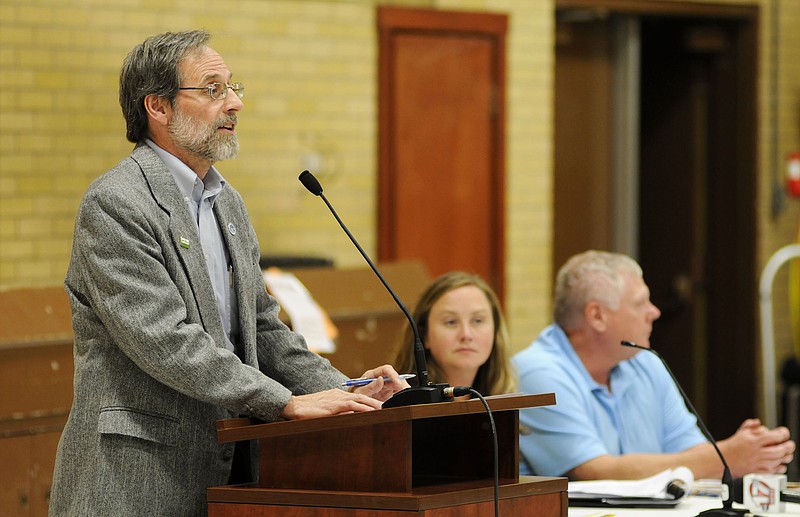The Missouri Department of Natural Resources issued Callaway Farrowing, LLC a permit for a hog farm with more than 10,000 hogs to operate in Callaway County.
This Kingdom City Concentrated Animal Feeding Operations (CAFO) has been an area of tension in the community since May when residents first received a neighbor notification in the mail stating that Eichelberger Farms Inc., an Iowa-based company associated with Callaway Farrowing, had intentions to create a hog operation of that size in the county.
Opponents of the CAFO organized the group Friends of Responsible Agriculture. As a group, they held a public meeting, wrote letters to the editor, hired an attorney for legal guidance and contacted DNR with their concerns over how manure applied as fertilizer could affect the county's waterways.
Jeff Jones with Friends For Responsible Agriculture said the organization will appeal the issuance of the permit. He feels there is potential that Callaway Farrowing's permit could still, ultimately, be denied.
The permit, issued on Friday, approves the operation of a hog farm for 9,520 swine over 55 pounds and 800 swine under 55 pounds. It approves a facility that will replace the current, smaller hog farm - Horstmeier Farms. That hog farm has the capacity for 5,600 sows.
The general description for the Concentrated Animal Feeding Operations (CAFO) on the DNR's permit lists potential buildings approved under the permit - two deep pit (farrowing and gestation) and one shallow pit (isolation) production buildings, which will have slotted floors and a mortality composter. The isolation building drains to the gestation building.
The department has issued responses to various concerns regarding the CAFO. Regarding the potential for the CAFO to pollute groundwater, DNR has stated that Missouri requires CAFOs to be designed by a professional engineer and to be designed, constructed and maintained as no discharge facilities. Callaway Farrowing's permit does not allow discharges to water for any reason. Regulations require the operation to inspect the confinement buildings and manure storage areas weekly for any structural leaks.
Jones said Friends For Responsible Agriculture would like to see a hog farm of this size be placed in a less populated area. Friends For Responsible Agriculture has 30 days to submit a written appeal to DNR's issuance of the permit.
"We have to keep taking each step as part of the process. We don't want to skip any steps," Jones said. "We want to make sure that we are thorough and accurate and respectful as we go."
Jones said he was not surprised by DNR's issuance of the permit.
"I'm a little frustrated, but at the same time I'm not too shocked," Jones said.
At the DNR hearing regarding the CAFO earlier this month, Jones said DNR said they had never denied a permit like this one before. He said he was still hoping the Department of Natural Resources would deny the permit.
After receiving written letters of concern regarding the potential CAFO, DNR held a meeting at Hatton-McCredie Elementary School in early November. Comments by DNR representatives at that meeting led Jones to believe they would issue the permit, although he said he was hoping they wouldn't.
At that meeting, Amanda Sappington, an environmental specialist with DNR's Water Protection Program, explained what the Department of Natural Resources' role is with these types of permits.
"If the facility meets all the design and operating permits that are established in the rules and regulations, then the department is required by law to issue the appropriate operating permit," Sappington said to the public at the meeting.
Sappington said the DNR Water Protection Program abides by not only state law but also the rules and regulations in the federal Clean Water Act of 1972. As long as the facility complies with DNR regulations, the agency, she added, cannot address non-water quality health impacts - such as odor and air pollution outside of the buffer distance, quality of life, or community values, property values, treatment of animals, civil agreements, out-of-state or corporate ownership and location of the CAFO.
The legislature took away the department's ability to oversee CAFO construction through House Bill 28 in 2013. Sappington said the revision in law "exempted industries from construction permits unless they're building an urban basin or lagoon."
Jones said he hopes the appeal process will help point out some other problems and lead to some reform.
"The DNR, their hands are a little bit tied in the fact that their regulations are handed to them by legislation," Jones said. "As the appeal takes place, I'm hoping that we can put regulations into place that will help hold those accountable who are going to be abusing our resources."
To read more DNR responses to citizen comments of concern, click here. And to see Callaway Farrowing's permit, click here.
Brittany Ruess contributed to this report.
Megan Favignano can be reached at (573) 826-2417 or [email protected].

